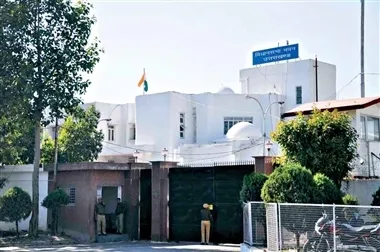Has the Uttarakhand Assembly Passed the Minority Educational Institutions Bill Amid Opposition Chaos?

Synopsis
Key Takeaways
- The Minority Educational Institutions Bill was passed by the Uttarakhand Assembly.
- It extends minority status to various communities, not just Muslims.
- A new authority, USMEA, will regulate these institutions.
- Madrasas must apply for recognition by 2026 or risk closure.
- The bill aims to create a unified regulatory framework for all minority institutions.
Dehradun, Aug 20 (NationPress) The Uttarakhand Assembly has successfully passed the Minority Educational Institutions Bill on Wednesday, aimed at regulating all minority institutions within the state by establishing a new governing body, despite a tumultuous uproar from opposition members.
Introduced just a day prior, the bill sparked intense discussions between the ruling party and the opposition, with the latter protesting over alleged irregularities in the recently conducted Panchayat elections and criticizing the state government for its inadequate law and order situation.
Before the Assembly session began, several leaders from the Congress held a sit-in demonstration outside the Assembly.
The approval of the Minority Educational Institutions Bill means that the advantages of minority status will no longer be exclusive to Muslims but will also encompass the Sikh, Jain, Christian, Parsi, and Buddhist communities.
At present, only Muslim educational institutions are recognized as minority status.
A new body, the Uttarakhand State Minority Education Authority (USMEA), will replace the existing Uttarakhand Madrassa Board, taking charge of recognizing and establishing standards for minority institutions.
This legislation sets a significant precedent not just in the state but across the nation, prompting a clash between the ruling BJP and the opposition Congress, with the latter questioning the intent of the Pushkar Dhami government.
The BJP rebutted these claims, arguing that the bill ensures equitable treatment for all minorities, while the opposition is accused of obstructing the repeal of the Uttarakhand Madrasa Board Act, established during the tenure of Harish Rawat in 2016, to safeguard its Muslim voter base.
Uttarakhand notably becomes the first state to enact legislation for implementing a Universal Civil Code (UCC) to govern personal laws such as marriage, divorce, and adoption.
Similar to the UCC, this bill aims to bring all minority community-run institutions under a unified regulatory authority. Previously, only institutions managed by the Muslim community were acknowledged as minority educational institutions.
By July 1, 2026, all madrasas operating in the state will be required to obtain affiliation from the Uttarakhand Education Board and then apply for minority status with the Uttarakhand State Authority for Minority Education (USAME). Only upon fulfilling the necessary criteria and conditions will the institutions be granted minority educational status; otherwise, unrecognized madrasas will face closure.










